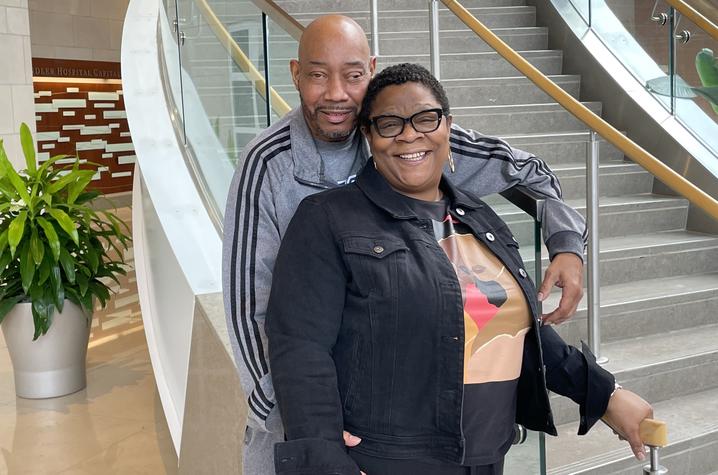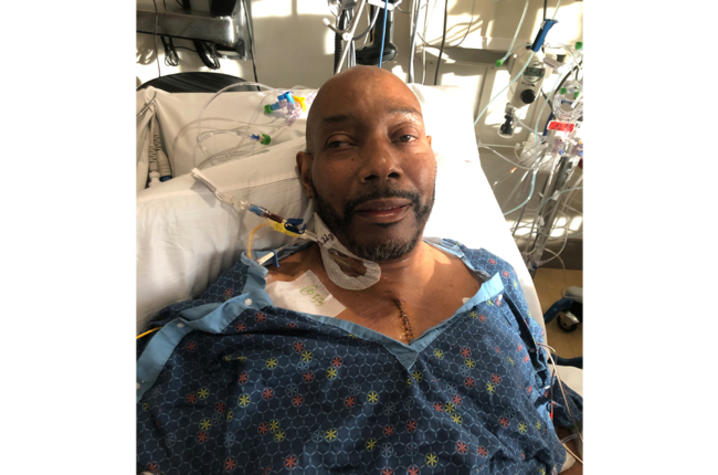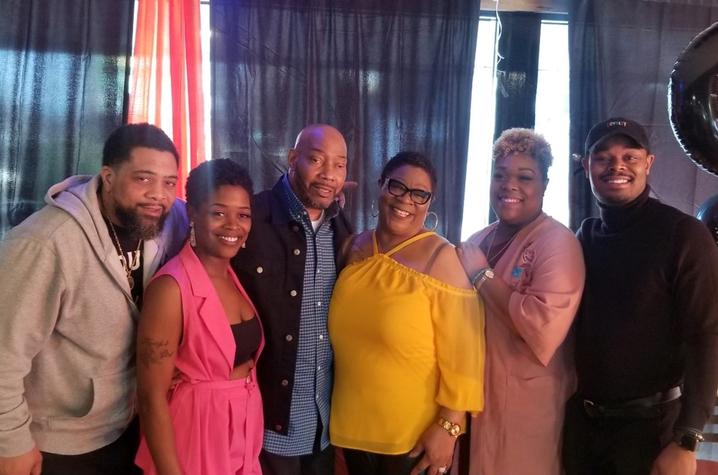'We can start making plans' — double organ transplant saves UK patient with rare disease
LEXINGTON, Ky. (Mar. 6, 2023) — Delara Porter has a lot to look forward to.
His birthday is coming up. A trip to Florida is in the works. Before long, he’ll be cleared to ride his beloved motorcycle again.
“It’s different now,” he said. “We can start making plans.”
Just a few months ago, Delara and his wife, Donna, had a very different outlook. Delara’s health had been in decline for a few years, starting in 2019 with some swelling in his legs following a long motorcycle trip.
“I just thought I was tired from my trip because we were gone three weeks,” Delara said. But when he returned to his job as a driver for UPS, he felt more exhausted and run down than ever.
He visited his primary care provider in Louisville, who ordered a stress test. He was so fatigued that he couldn’t complete the test. Still, Delara wasn’t worried. He expected to hear back from his doctor in the next few days with the test results.
Instead, he was admitted to the hospital that day. Delara spent the next month in the hospital getting treatment for both heart and kidney failure.
But the news got worse — the damage to his heart was too severe, and transplant was his only option.
“I was so scared for him,” Donna said. “But I knew I couldn’t show that. I didn’t know if he was going to make it. I would sit up in bed at night and watch him to make sure the covers were moving.”
Norton Healthcare cardiologist Kelly McCants, M.D., referred him to UK HealthCare in early 2022. Part of the statewide Gill Affiliate Network, Norton Healthcare and UK HealthCare work together to connect patients with rare, severe illnesses like Delara to specialists for further evaluation and treatment. At UK HealthCare’s Transplant Center, Delara underwent evaluation for both a heart and a kidney transplant.
A routine echocardiogram showed the cause of his heart failure. The muscular walls of the heart were very thick, which in turn led to inefficient pumping and blood circulation. Further testing led to a definitive diagnosis, the root of all of his health issues: amyloidosis.
“Amyloidosis is a disease where you have unusual proteins that get deposited between the heart muscle cells, that make the heart really thick,” said Gaurang Vaidya, M.D., director of cardiac amyloidosis at UK HealthCare’s Gill Heart & Vascular Institute. These proteins, called amyloid, can get deposited into any tissue or organ, and interfere with their function. Delara has hereditary transthyretin amyloidosis, a genetic form of the disease in which abnormal proteins made by his liver built up in his heart.
The accumulation of these proteins in his heart was so gradual that even though Delara was born with amyloidosis, he didn’t start to feel the effects until his mid-50s. By the time he was diagnosed, there was no alternative but to replace his heart and kidney.
“No amount of medicine could have treated him,” said Vaidya. “He was so far advanced that only heart transplantation could have helped him.”
But there was yet another complication. The pre-transplant evaluation revealed an health issue known as smoldering myeloma, a precancerous condition in which plasma cells in the bone marrow divide too quickly and produce abnormal cells. These abnormal cells can in turn cause multiple myeloma, a rare cancer of the plasma cells.
The complication was a serious problem — a cancer diagnosis would automatically make Delara ineligible for organ transplant.
“Anytime someone undergoes an organ transplant, we put them on immunosuppressive medication that will prevent them from rejecting the organ,” said Vaidya. “In his case, this medication would fan the flames of his precancerous condition.”
In other words, the transplant drugs could potentially kickstart Delara’s precancerous condition into full-blown cancer.
But Vaidya wasn’t ready to give up on Delara. He assembled UK HealthCare’s Amyloidosis Alliance, a group of cardiologists, oncologists, nephrologists and surgeons from across the health care enterprise to discuss Delara’s case. Aside from the smoldering myeloma, Delara was an ideal transplant candidate. He didn’t drink or smoke, nor was he overweight. He had a common blood type, and most importantly, Delara had Donna and a large, supportive family. Surely, there was something they could do for him.
“There was a revelation,” Vaidya said. “The Markey Cancer Center oncologist present, Dr. Chait Iragavarapu, said risk of progression to full blown cancer was very, very low.”
According to Iragavarapu, Delara would die of heart and kidney failure long before the cancer would ever become an issue. And in the unlikely event that his condition progressed to multiple myeloma, it would be easily treatable with chemotherapy without any effect on his overall survival.
“After this discussion, there was a big shift,” Vaidya said. “The way that everyone was looking at his case, there’s this sudden switch, and everybody’s thinking he could be a candidate for transplantation. We were able to get past this block and traditional thinking where this precancerous condition would have made him ineligible and think progressively about how we can help this patient. This is an extremely laudable thing that happened at UK.”
***
Delara was put on this list for both a heart and kidney transplant. After being told it could take a year to find a suitable match, the Porters tried to put it out of their minds.
“In my head, I’m thinking, ‘There’s no way we’re going to be able to wait a year,’” said Donna. “He needs two organs from the same person — how likely is that? I didn’t even pack a bag. We were just going on, living our life. And then we got the call.”
The first call turned out to be a false alarm. After driving to Lexington, getting prepped and ready for surgery, his surgeon decided the heart wasn’t quite right for Delara. He and Donna headed back home.
“I think it was a good thing,” Donna said of the false alarm. “We knew what to expect. It got the jitters out.”
The real call came about two weeks later. Even though they had “rehearsed” his surgery, there was still the fear and uncertainty.
“I was really scared, because I didn’t know if I was going to make it,” said Delara. “I thought I was going to leave everybody. I’m the patriarch of my family. Everything comes through me. If I had left on short terms, I would have left them distraught.”
“It’s a lot, but I feel like this is what I’ve been called to do,” said Donna. “And we just do it. There are days when I cry. There are days I get angry. But then it could be worse. He could still be on that list. He could not be here with us.”
On Dec. 18, Delara got his new heart, courtesy of Rajasekhar S. R. Malyala, M.D., and his surgical team. The next day, he got a kidney, transplanted by Roberto Gedaly, M.D. When he woke up, he only had one request: to see Mr. Brown, his spaniel-bichon frise mix.
In the days that followed, Delara felt better than he had in years.
“They asked me if I wanted to listen to my heart,” he said. “It was beating like nobody’s business. It was beating just fine.”
What does he think about having someone else’s organs in his body?
“I don’t think about it,” he said. “Whoever gave it to me wanted to help somebody else. I appreciate it because it gave me a second chance. They wanted to help.”
A little over a week later, Delara was discharged, and he and Donna got to ring in the new year at home.
“Feeling good, feeling great,” he said. “It’s a blessing.”
***
Even with two new organs, Delara’s journey is not over yet.
“We treated the organs affected by the amyloidosis, but we haven’t treated the amyloidosis itself,” said Vaidya. Medication and follow-up visits will be required to ensure the amyloid protein doesn’t continue to build up.
Delara continues to check in regularly with both his transplant surgeons as well as Vaidya. And even though telemedicine is an option, Delara prefers to make the trip to Lexington.
“Everyone here is so nice,” Delara said. “We don’t mind the drive.”
Delara and Donna are looking forward to Delara’s birthday and having the whole family over for food and games. Their four children have become more proactive with their health. Their oldest daughter is getting screened for amyloidosis.
“The whole family is getting serious about health care,” said Delara. “You know you’re not bulletproof. I thought I was. I thought I was the healthy guy out there. Our youngest daughter said she’s so used to seeing her daddy be strong. And now I’m on the mend. We’re just really thankful. It’s like a second chance for everyone.”
***
Vaidya is giving a series of free educational talks on the diagnosis and treatment of cardiac amyloidosis. More information about the talk on March 8 in Hazard available here, and information about the talk on March 9 in Covington can be found here.
UK HealthCare is the hospitals and clinics of the University of Kentucky. But it is so much more. It is more than 10,000 dedicated health care professionals committed to providing advanced subspecialty care for the most critically injured and ill patients from the Commonwealth and beyond. It also is the home of the state’s only National Cancer Institute (NCI)-designated Comprehensive Cancer Center, a Level IV Neonatal Intensive Care Unit that cares for the tiniest and sickest newborns and the region’s only Level 1 trauma center.
As an academic research institution, we are continuously pursuing the next generation of cures, treatments, protocols and policies. Our discoveries have the potential to change what’s medically possible within our lifetimes. Our educators and thought leaders are transforming the health care landscape as our six health professions colleges teach the next generation of doctors, nurses, pharmacists and other health care professionals, spreading the highest standards of care. UK HealthCare is the power of advanced medicine committed to creating a healthier Kentucky, now and for generations to come.







